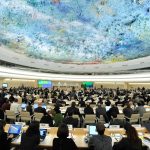By Coptic Solidarity –
May 4, 2020
The US Commission on International Religious Freedom (USCIRF) released its annual report on April 28 which monitors significant changes in religious freedom during 2019. Each year, Coptic Solidarity reviews the USCIRF report and publishes an assessment of the report including areas of agreement, constructive criticism, and recommendations for future reports. The USCIRF made some significant changes to their report this year including:
- Primarily focusing on Countries of Particular Concern (CPC’s) and countries on the Special Watch List (SWL)
- USCIRF stopped using its own Tier 2 category and is now using the State Department CPC, SWL, and Entities of Particular Concern (EPC’s) categories.
- Previously, the USCIRF recommended countries to the Tier 2 category if they were considered to meet at least one of the CPC three-fold criteria for religious freedom violations which are systematic, ongoing, and egregious.
- As of this report, USCIRF’s criteria to be recommended for SWL mandates a country meet two of the three CPC standards.
- Shortened reports on individual countries to focus on the justifications for USCIRF recommending they be added to CPC or SWL groups.
Positives
The majority of the Egypt chapter contains accurate and informative information regarding the state of religious freedom in Egypt. Coptic Solidarity appreciates the tireless efforts made by USCIRF staff to produce this important annual resource and successfully improving it each year. Positive points of interest include:
- USCIRF has reported on claims by the Ministry of Education to reform curricula to eliminate discriminatory text and promote inclusivity. This year, the USCIRF report notes that “progress the ministry made during 2019 was unclear.” This is a meaningful inclusion. As CS noted two years ago in our assessment:
“ Based on previous experience, CS defers judgement on this as an improvement until action has transpired. Also, the USCIRF report fails to mention the duality of education systems whereby Al-Azhar provides a parallel system, from Kindergarten to Ph.D., for over two million pupils and students who are by definition Muslims only. This divisive system (financed by all taxpayers including non-Muslims) offers hate-filled curricula that can only breed extremism, foster societal divisiveness and violence, and produce future terrorists.”
CS was prescient in our assessment two years ago and the points remain as valid today as they did when made.
- The report excellently depicts the reality of how poorly the Egyptian government has implemented the “Church Law,” Law 80/2016. The law was widely touted by US legislators and government officials as an improvement, despite multiple rights groups including a review by the Egyptian Initiative for Personal Rights which explained exactly how the law was inherently discriminatory in that it places burdensome requirements on church building and repairs that do not apply to the construction of mosques. As EIPR stated:
“At the very least, a law regulating the construction of houses of worship should treat all citizens equally regardless of religion and make no distinctions between religions. A special law to regulate the construction of churches already sends a discriminatory message that the state distinguishes Christian citizens from Muslim citizens. While the state permits the construction of mosques based on compliance with building codes and subordination to the Ministry of Endowments, it imposes additional conditions on churches, most significantly the need to obtain a permit from the competent governor approving the practice of religious rites at a specific location.
This year, the USCIRF report noted that at least 25 churches and church-related facilities have been closed in 2019 with only one being reopened in January 2020. It also recorded that just over 25% of existing churches had received approvals (1,412 of the 5,515 in process) despite assurances in the original law that all existing churches would have automatic approval. Now in 2020, a mere 200 church properties have final approvals whereas the remainder still have to fulfill, often onerous conditions, that are not placed on Muslim places of worship. Moreover, the report notes that the few new church permits have been granted in new construction zones, but not in the existing communities that still lack houses of worship.
- The report importantly states that “Government authorities have used these real security threats as a pretense to repress civil society, harassing and imprisoning journalists, lawyers, and activists” and notes the raid on Mada Masr by security forces and the imprisonment of human rights/religious freedom defender, Ramy Kamel. Coptic Solidarity strongly concurs with the USCIRF that the arrest of Kamel and many other activists is behavior which “directly contradict the government’s assurances that it is working to improve conditions for civil society…”
- Cites the decline in number of mob attacks on Christians yet includes the important context that the vast majority of perpetrators of attacks on Christians still have impunity; Most of these incidents are still dealt with outside the judiciary in informal community meetings which an Egyptian official recently referred to as a “calming meeting” instead of a reconciliation session. This indicates Egyptian official’s acknowledgement that reconciliation sessions are inherently unjust and a possible desire to improve their image.
- CS in in agreement with all of the recommendations to the US Government with the exception of SWL designation vs. CPC designation.
Constructive Criticism
- Owing to the established report format and minimal length, it can be difficult to place the cited improvements within the broader context. Coptic Solidarity fully supports mention of positive steps made by the Egyptian government to improve religious freedom, but the improvements cited in the report are essentially symbolic. The Egyptian government has not made any substantive progress towards equal citizenship rights for religious minorities in any of these areas CS has documented in our recourses. CS welcomes a more in-depth exploration of the situation for religious minorities in Egypt by USCIRF.
(44 Simple Questions to the Egyptian Authorities Regarding the Situation of the Copts) (Annual State Department Report Confirms Systematic Discrimination Against Religious Minorities in Egypt)
- Coptic Solidarity continues to advocate that Egypt by placed on the CPC list. USCIRF has placed Egypt on their Tier 2 list for the previous 3 years meaning they engaged in or tolerate at least one of the three elements in the standard of “systematic,” “ongoing,” or “egregious” violations. The USCIRF believes Egypt qualifies for the “systematic” and “ongoing” criteria of religious freedom violations, but not “egregious.” For this reason, Egypt was placed on the USCIRF’s SWL list. Essentially, the USCIRF’s view on qualifying violations remain the same over the last four years.
Doubtless there is room for disagreement on what constitutes “egregious” violations, but it is worth noting that the USCIRF did not believe Egypt qualified during previous years with more anti-Christian mob violence, multiple bombing attacks on churches, and individual murders such as occurred in el-Arish in 2016. This begs the question, what WOULD qualify as egregious religious freedom violations in Egypt?
While some maintain that “egregious” primarily indicates large scale violent crimes such as mass incarceration and murder of religious minorities, individual Copts often share that it is the daily grind of discrimination, threats and attacks against their persons and properties by Muslims, and the pervasive threat of imprisonment for any perceived slight towards the current government, or even voicing criticism or openly advocating for equal citizenship rights, that is what drives many of those with resources to flee the country. How does this compare to a country such as Nigeria (CPC), in which thousands of Christians have been slaughtered in recent years, yet Christians in the majority of the country have equal citizenship rights and can rise to positions of influence?
- While some consider Sheikh El-Tayeb of al-Azhar signing a document with Pope Francis on interfaith co-existence a positive improvement, if only symbolic, CS believes this is in fact counterproductive and undermines the message of equality for religious minorities. As CS noted in our assessment last year, the message Sheikh El-Tayeb regularly preaches to Arabic Muslim audiences and teaches at al-Azhar directly contradicts the sentiment of the Document on Human Fraternity for World Peace and Living Together. Coptic Solidarity also published a report titled, A Glimpse Into the Mindset of Sheikh Ahmed al-Tayeb, The Grand Imam of al-Azhar on this very issue. In addition to CS’s reporting, there are many public statements made by El-Tayeb demonstrating his overt deception. By including interaction or actions by El-Tayeb in the USCIRF report without any additional context, it serves to perpetuate a false narrative that he is actually working to improve religious freedom in Egypt.
- The report indicates that there is approximately one mosque for every 820 Muslim individuals versus one church for every 2,430 Christians which represents over a 300% disparity. Coptic Solidarity is unclear on the source of these figures and find them misleading. On the one hand, it is known that there are over 120,000 mosques, plus over one million ‘prayer halls’ everywhere, including in government offices and schools, for a Muslim population of 90 million. Hence, the number of ‘mosques per so many people’ is meaningless unless we keep in mind the prayer halls. On the other hand, in absence of recent official figures, we can (optimistically) assume that there are approximately 4,000 churches for over 12 million Christians of all denominations, with only half of them for the Orthodox who represent more than 85% of all Christians in Egypt, leading to ‘one (Orthodox) church for every 5,000 people.’
Recommendations
- CS recommends including a point in the Recommendations section regarding the many prisoners of conscience and urging the US government to prioritize their release. There are numerous Christian, Muslim, and secularist Egyptians who have been unjustly imprisoned for their beliefs and related activism.
- CS urges USCIRF to include a Recommendation to the US government to both publicly and privately work with the Egyptian government at the UN level to draw attention to their repeated blocking of NGO ECOSOC applications for those groups such as CS who Egypt has actively blocked from receiving accreditation. Additionally, CS recommends including reference either in this annual report or in an extended report on Egypt regarding Egypt’s participation in the UNHRC at which Egypt regularly obfuscates. For example, during the Outcomes session of Egypt’s Universal Periodic Review the delegate, H.E. Mr. Alaa Youssef, adamantly denied imprisonment of innocent citizens, closure of NGOs, and many other rights violations. He then claimed that some NGO’s have falsely reported about abuses taking place. While the US is no longer on the UNHRC, there is still ample opportunity to shine a light and further engage.
- CS recommends adding information in the 2020 report on the following areas:
- The Egyptian judicial system, exposing the revolving door of arrest, pre-trial detention renewal hearings at which many prisoners have their detentions automatically renewed (for months or even years) without evidence, and re-arrest after release orders have been given, which represent significant violations against prisoners of conscience.
- The mistreatment and torture prisoners of conscience are experiencing in increasing levels by the state security (now called ‘National Security’). These incidents are occurring within and outside prisons.
- The discrimination against Coptic footballers and athletes who are unable to represent Egypt in the Olympics, on the national, reserve, or youth football teams, or in the premier Egyptian football leagues.





